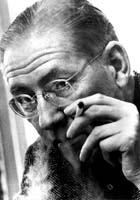The Black Riviera
by
Mark Jarman
For Garrett Hongo
There they are again. It's after dark.
The rain begins its sober comedy,
Slicking down their hair as they wait
Under a pepper tree or eucalyptus,
Larry Dietz, Luis Gonzalez, the Fitzgerald brothers,
And Jarman, hidden from the cop car
Sleeking innocently past. Stoned,
They giggle a little, with money ready
To pay for more, waiting in the rain.
They buy from the black Riviera
That silently appears, as if risen,
The apotheosis of wet asphalt
And smeary-silvery glare
And plush inner untouchability.
A hand takes money and withdraws,
Another extends a plastic sack--
Short, too dramatic to be questioned.
What they buy is light rolled in a wave.
They send the money off in a long car
A god himself could steal a girl in,
Clothing its metal sheen in the spectrum
Of bars and discos and restaurants.
And they are left, dripping rain
Under their melancholy tree, and see time
Knocked akilter, sort of funny,
But slowing down strangely, too.
So, what do they dream?
They might dream that they are in love
And wake to find they are,
That outside their own pumping arteries,
Which they can cargo with happiness
As they sink in their little bathyspheres,
Somebody else's body pressures theirs
With kisses, like bursts of bloody oxygen,
Until, stunned, they're dragged up,
Drawn from drowning, saved.
In fact, some of us woke up that way.
It has to do with how desire takes shape.
Tapered, encapsulated, engineered
To navigate an illusion of deep water,
Its beauty has the dark roots
Of a girl skipping down a high-school corridor
Selling Seconal from a bag,
Or a black car gliding close to the roadtop,
So insular, so quiet, it enters the earth.
********************************************
Okay, I've never heard of this fellow -- but man can he write (of course, just my opinion). My poetic education ended sometime in the early to mid 80's with my writing in general -- both gone like dinosaurs. I am fortunate, my writing came back (relative merits for later discussion, I'm sure).
I'm drawn to the seductive darkness about this particular poem. The shifting perceptions and "time akilter" quality echoing the effects of the drugs.
At the same time vivid and distant, formal yet loose -- and there's more at the link.
Great first call Rob!


